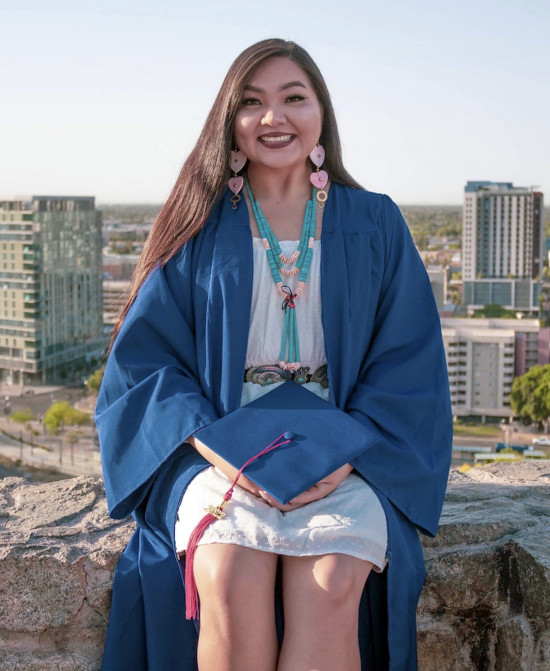 Renae Blackwater graduated from MCC in Spring 2022, and served as an intern at Tempe-based LLC Indigenous Health over the summer. While there, she played an integral role in the organization – hosting an inaugural football camp for Native Youth at MCC in July that was coached by members of the University of California, Los Angeles (UCLA) Bruins Football team.
Renae Blackwater graduated from MCC in Spring 2022, and served as an intern at Tempe-based LLC Indigenous Health over the summer. While there, she played an integral role in the organization – hosting an inaugural football camp for Native Youth at MCC in July that was coached by members of the University of California, Los Angeles (UCLA) Bruins Football team.
She recently spoke at the American Indian Institute’s anniversary celebration, offering praise of her experience at MCC. “After I spoke with an advisor at MCC, I became part of a community who cared.”
A particular member of the American Indian Institute who offered Renae guidance was manager Sam Stevens, who stayed connected with her after graduation.
With help from Sam, the Institute, an extended professional network, and a number of MCC students, Renae helped find volunteers for the football camp, hosted by Indigenous Health and its affiliate organization, United Natives.
The UCLA Connection
Crystal Lee, Ph.D., is founder and CEO of Indigenous Health and United Natives, a nonprofit (all staff from both organizations are 100% Native, as well as 95% of their clinical team).
She completed her postdoctoral research at UCLA and is personally connected with quarterback Dorian Thompson-Robinson’s family. For Lee, the camp was a natural progression of a shared mission of overall health promotion for Natives.
Lee, an entrepreneur-scientist and once student athlete of Scottsdale Community College, believed the organizations could use sports as a catalyst to promote good physical and mental health, along with self-discipline, among Native youth.
UCLA teammates Thompson-Robinson, Zach Charbonnet, Jake Bobo, and Titus Mokiao-Atimalala headed for the Valley in full support of this mission.
MCC Hosts the Activities
MCC Athletic Director John Mulhern was asked if MCC could host the camp. John collaborated with Sam, who contacted Renae for help organizing the event. “We were very excited to use this event to showcase MCC and its commitment to Native American students and their presence on campus,” Sam said.
Native youth between middle and high school ages were coached in drills and other football activities at MCC’s John D. Riggs Stadium. After the camp, attendees gathered in the Theo J. Heap Gymnasium for a Q&A with the organizers and UCLA teammates, who shared a message of hope and inspiration.
A pow wow group then performed for the audience, sharing the rich tradition and culture of Native dance (courtesy of Indigenous Enterprise).
The event as a whole was a huge success and brings the hope of an even bigger turnout next time. The goal is making the football camp annual.
Health Promotion as Central Mission
A health-centered event such as this one is a cornerstone for the physical wellbeing of Native youth, and also for a sense of community and representation of Native peoples. “There are rarely opportunities for football camps like this one for indigenous youth groups,” said Renae. “It was important that we made it free and accessible, and also representative.”
In reference to receiver Titus Mokiao-Atimalala, who is native Hawaiian, Renae continued: “Indigenous kids can look up to him and say, ‘if Titus can do it [be a Division-1 college athlete], then I can, too.’ Something like that can make a big impact.”
Renae hopes to continue living out her mission. “I want to help kids on reservations. I want them to have the support that helped me so much.”
MCC has the largest population of Native American students in the state of Arizona. Every one of the 22 registered tribes in Arizona is represented at MCC, and the college ranks eighth in the nation for the successful degree completion of Native American students.

